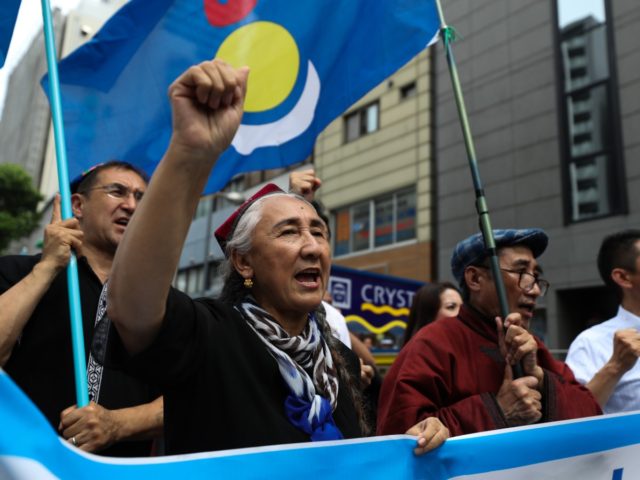The Chinese Communist Party (CCP)’s mistreatment of Uyghur Muslims extends beyond China’s borders and into foreign countries, with Beijing ordering Chinese diplomats to “harass and intimidate” members of the ethnic group in Japan, the U.S. State Department’s 2019 Religious Freedom Report on Japan revealed on Wednesday.
Approximately 3,000 Uyghur Muslims reside in Japan, with most established in and around the capital, Tokyo, according to the report. Representatives of Japan’s Uyghur community say that, over the past year, the Chinese embassy in Tokyo waged an intimidation campaign against Uyghurs in which Japanese government officials, businesses, private citizens, and Uyghur Muslims were harassed, all in an attempt to discourage public criticism of the CCP’s human rights abuses of Uyghurs in the Chinese region of Xinjiang.
According to the assessment, the Japan Uyghur Association said that the Japanese government demonstrated “some willingness” in the past year to protect Uyghurs in the country from this antagonism by engaging in “limited direct diplomacy” with Chinese government officials over the issue.
In late November 2019, a group of Uyghur Muslims living in Japan spoke to the Japan Times anonymously about China’s harassment. One of the Uyghurs – referred to in the article as “Samsil”– explained that the community feels monitored and targeted by the CCP even on foreign soil.
“’The Chinese authorities can easily identify us,” Samil explained to the reporter when asking that his real name not be published. “And that will only bring more suffering to our families [still in China].”
Another member of the group, “Ilan,” agreed that Uyghurs in Japan were still being tracked by the CCP. She told the newspaper that her cellphone was hacked by what she suspects were Chinese authorities. The hackers took control of her phone remotely, going through her Chinese WeChat messaging app to scan her personal messages with Uyghur relatives still living in Xinjiang. Ilan detailed the spying incident:
Ilan was at home with a friend when she noticed her phone suddenly came to life. ‘Someone was controlling my WeChat account, moving through it,’ she recalls. ‘They were going through my contact list. I was so surprised, I kept asking my friend ‘What’s going on, what’s going on?’ Ilan and her friend looked on in disbelief as they watched someone access the phone remotely and parse through her chat records in real time. They pulled up photos, videos, and documents written in Arabic.
Other members of the group said that, despite living outside of China, they continue to live in fear of discrimination from other Chinese people living in Japan, who are still subject to CCP propaganda campaigns against Uyghur Muslims. Some said they worry about “exposing” their Uyghur identity in front of other Chinese people on the island: “The Chinese media portrays us [Uyghurs] in negative terms … The image they [Chinese in Japan] have of us is not good.”
Home to an estimated 10 million ethnic Uyghurs, China’s northwestern Xinjiang territory is the site of longstanding ethnic tension between the region’s ruling Han Chinese majority and minority Uyghurs native to the land. The Turkic-speaking, Sunni Muslim Uyghurs of Xinjiang are viewed as a threat to the CCP’s desire for cultural and political assimilation to the Communist Party across China. To achieve assimilation, the Han Chinese majority in Xinjiang has long criminalized minority cultural and religious practices in the region. In recent years, this discouragement has evolved into a stringent crackdown on any and all demonstrations of ethnic identity by the Uyghurs, culminating in the establishment of concentration camps for the detainment of Xinjiang’s ethnic minorities in 2017.
Since then, the CCP has shipped between 1 million to 3 million members of Muslim ethnic minority groups, most of them Uyghurs, to detention camps in Xinjiang for so-called “extremist” behavior, such as wearing religious clothing, or for harboring “politically incorrect” views. China labels the facilities “re-education camps” or “political training centers,” officially denying the existence of camps for the purpose of detention in Xinjiang.
On Wednesday, the U.S. State Department said that the CCP’s campaign against Uyghurs in Xinjiang has become so extensive that the department was forced to add a separate section to its yearly report on religious freedom in China to fully address the “the scope and severity of reported religious freedom violations specific to the region.”

COMMENTS
Please let us know if you're having issues with commenting.